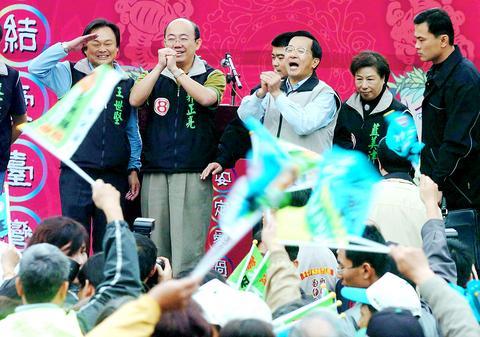President Chen Shui-bian (
Chen once again vowed to change the names of government agencies overseas and state-run enterprises during a campaign activity held in Taipei City yesterday.

PHOTO: CHIANG YING-YING, TAIPEI TIMES
"We don't have to fear China's opposition to Taiwan's reforms and changes," Chen said after praying for DPP candidates at Baoan Temple (
"In fact, China has never stopped threatening Taiwan while we conducted democratic reforms over the past few decades."
Chen said that, from the lifting of martial law and bans on establishing political parties and newspapers, to elections for the legislature and direct elections for president, China has never voiced its consent to Taiwan's changes.
"But we would never give up our transformation just because of China's intimidation," Chen said.
Meanwhile, Chen rebutted some people's argument that the state-run corporations will not make profits anymore if those businesses quit using "China" or "Chinese" in their titles, criticizing these comments as "nonsense."
"Did Wang Yung-ching's (
"Why can't we change our name?" Chen asked, pointing out that Taiwan had already successfully changed the bizarre names of Taiwan's resident office in Washington from "Coordination Council for North American Affairs" to "Taipei Economic and Cultural Representative Office in the US."
The Association of East Asian Relations, the representative office in Japan, was also changed to the "Taipei Economic and Cultural Representative Office."
By citing a statement that Taipei Mayor Ma Ying-jeou (
He emphasized that the case is the same as when Ma needed a majority in the Taipei City Council for a better administration.
Chen stressed that only when the pan-green camp wins the legislative elections could Ma have a chance to extend his political future, otherwise Chinese Nationalist Party (KMT) Chairman Lien Chan (
"Just as Taipei Mayor Ma Ying-jeou appealed to Taipei citizens as he sought for his mayoral reelection in 2002, which Ma said that since voters supported his re-election, they should also promise him a stable city council for the sake of better municipal construction," Chen said.
"So did I. I asked all of you to vote for the pan-green camps so that I could have the back-up of the legislature to continue implementing all kinds of reform," Chen said.
Also see stories:

MAKING WAVES: China’s maritime militia could become a nontraditional threat in war, clogging up shipping lanes to prevent US or Japanese intervention, a report said About 1,900 Chinese ships flying flags of convenience and fishing vessels that participated in China’s military exercises around Taiwan last month and in January last year have been listed for monitoring, Coast Guard Administration (CGA) Deputy Director-General Hsieh Ching-chin (謝慶欽) said yesterday. Following amendments to the Commercial Port Act (商港法) and the Law of Ships (船舶法) last month, the CGA can designate possible berthing areas or deny ports of call for vessels suspected of loitering around areas where undersea cables can be accessed, Oceans Affairs Council Minister Kuan Bi-ling (管碧玲) said. The list of suspected ships, originally 300, had risen to about

DAREDEVIL: Honnold said it had always been a dream of his to climb Taipei 101, while a Netflix producer said the skyscraper was ‘a real icon of this country’ US climber Alex Honnold yesterday took on Taiwan’s tallest building, becoming the first person to scale Taipei 101 without a rope, harness or safety net. Hundreds of spectators gathered at the base of the 101-story skyscraper to watch Honnold, 40, embark on his daredevil feat, which was also broadcast live on Netflix. Dressed in a red T-shirt and yellow custom-made climbing shoes, Honnold swiftly moved up the southeast face of the glass and steel building. At one point, he stepped onto a platform midway up to wave down at fans and onlookers who were taking photos. People watching from inside

Japan’s strategic alliance with the US would collapse if Tokyo were to turn away from a conflict in Taiwan, Japanese Prime Minister Sanae Takaichi said yesterday, but distanced herself from previous comments that suggested a possible military response in such an event. Takaichi expressed her latest views on a nationally broadcast TV program late on Monday, where an opposition party leader criticized her for igniting tensions with China with the earlier remarks. Ties between Japan and China have sunk to the worst level in years after Takaichi said in November that a hypothetical Chinese attack on Taiwan could bring about a Japanese

STREAMLINED: The dedicated funding would allow the US to transfer equipment to Taiwan when needed and order upgraded replacements for stockpiles, a source said The US House of Representatives on Thursday passed a defense appropriations bill totaling US$838.7 billion, of which US$1 billion is to be allocated to reinforcing security cooperation with Taiwan and US$150 million to replace defense articles provided to the nation. These are part of the Consolidated Appropriation Act, which the US House yesterday passed with 341 votes in favor and 88 against. The act must be passed by the US Senate before Friday next week to avoid another government shutdown. The US House Committee on Appropriations on Monday unveiled the act, saying that it allocates US$1 billion for the Taiwan Security Cooperation Initiative